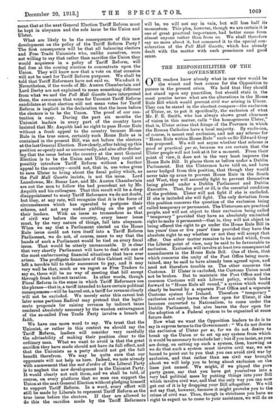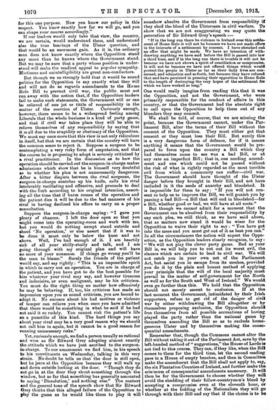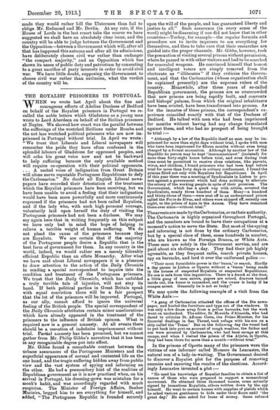THE RESPONSIBILITIES OF THE GOVERN MENT.
OUR readers know already what in our view would be the wisest and best course for the Opposition to pursue in the present crisis. We hold that they should not stand upon any punctilios, but should state in the most precise terms what are the alterations in the Home Rule Bill which would prevent civil war arising in Ulster. They can be stated in the shortest compass—the exclusion of Ulster, or, to put it specifically, the exclusion of what Mr. F. E. Smith, who has always shown great clearness of vision in this matter, calls " the homogeneous Ulster," that is, Ulster minus that fringe of the Province in which the Roman Catholics have a local majority. By exclusion, of course, is meant real exclusion, and not any scheme for " Home Rule within Home Rule " such as Sir Edward Grey has proposed. We will not argue whether that scheme is good or practical per se, because we are certain that the Ulster people will not look at it for a moment. From their point of view, it does not in the very least improve the Home Rule Bill. It places them as before uuder a Dublin Parliament. But the Ulstermen have told us, and have never budged from this position, that though they would never take up arms to prevent Home Rule in the South and West, they will assuredly fight to prevent themselves being placed under a Dublin Parliament and Dublin Executive. That, for good or ill, is the essential condition of the problem. Ulster will not fight if she is excluded. If she is included she will fight. The only deviation from this position concerns the question of the exclusion being called temporary or permanent. The Ulstermen are practical people, and will not object to their exclusion being called " temporary " provided they have an absolutely untitnited right to make it permanent—that is, they will not object to being offered the right to go under the Howe Rule Bill in ten years' time or five years' time provided they have the absolute right to say whether or not they will accept that offer. One other matter remains to be noted which, from the Liberal point of view, may be said to be favourable to exclusion. Exclusion will involve at least two consequential amendments in the Home Rule Bill. One of them, that which concerns the unity of the Post Office being main- tained, may be said to have already been agreed upon, and need not therefore trouble us. The other concerns the Customs. If Ulster is excluded, the Customs Union must not be broken. But to maintain the Post Office and the common Customs will suit Liberal policy, which looks forward to "Home Rule all round," a system which would clearly be barred by a separate Post Office and a separate Customs system for Ireland. Therefore " temporary " exclusion not only leaves the door open for Ulster, if she becomes converted to Nationalism, to come under the Dublin Parliament, but also leaves the door open for the adoption of a Federal system to be organized at some future date.
Now what we want the Opposition leaders to do is to say in express terms to the Government : " We do not desire the exclusion of Ulster per se, for we do not desire to break up the Union or to set up any system from which it would be necessary to exclude her ; but if you insist, as you are doing, on setting up such a system, then, knowing as we do that such a system must involve civil war, we are bound to point out to you that you can avoid civil war by exclusion, and that rather than see civil war brought about we will help you to bring about exclusion on the lines just named. We might, if we played the pure party game, say that you have got yourselves into a very bad political mess by putting things into your Bill which involve civil war, and that the only way you can now get out of it is by dropping your Bill altogether. We will not say that, however, because it might provoke you to the crime of civil war. Thus, though in strictness you have no right to expect us to come to your assistance, we will do so
for this one purpose. Now you know our policy in this respect. You know exactly how far we will go, and you can shape your course accordingly." If our leaders would only take that view, the country, we are certain, would understand them, and understand also the true bearings of the Ulster question, and that would be an enormous gain. As it is, the ordinary man does not know exactly where the Opposition stand any more than he knows where the Government stand. But we may be sure that a party whose position is under- stood will make the readiest appeal to popular sympathy. Mistiness and unintelligibility are great non-conductors.
But though we so strongly hold that it would be sound politics for the Opposition to say exactly what they will and will not do as regards amendments to the Home Rule Bill to prevent civil war, the public must not run away with the notion that, if the Opposition leaders fail to make such statements, the Government will or can be relieved of one jot or tittle of responsibility in the matter of the coercion of Ulster. Curiously enough, however, there seems to be a widespread feeling among Liberals that the whole business is a kind of party game, and that if civil war takes place they will be able to relieve themselves of any responsibility by saying that it is all due to the stupidity or obstinacy of the Opposition. We must say once more that this view is not only ridiculous in itself, but that we are certain that the country will have the common sense to reject it. Suppose a surgeon to be contemplating a very risky form of amputation, and that the course he is proposing to adopt is severely criticized by a rival practitioner. In the discussion as to how the operation should be carried out the surgeon-in-charge makes
admissions which show that he is himself very doubtful
as to whether his plan is not unnecessarily dangerous. After a bitter dispute between the rival surgeons, the surgeon-in-charge snatches up his knife, calls his rival intolerably vacillating and offensive, and proceeds to deal with the limb according to his original intention, assert- ing all the time that if harm comes of the operation and the patient dies it will be due to the bad manners of his rival in having declined his offers to carry on a proper consultation.
Suppose the surgeon-in-charge saying: "I gave you plenty of chances. I left the door open so that you
might come into the operating-room and work with me, but you would do nothing except stand outside and shout ' No operation,' or else assert that if it was to be done it must only be below the knee and not above. Well, I've had enough of it. I am heartily sick of all your shilly-shally and talk, and I am going through with my original plan and will have no more of your nonsense. If things go wrong you'll be the man to blame." Surely the friends of the patient would say, and say rightly : " This is an impossible spirit in which to carry out an operation. You are in charge of the patient, and you have got to do the best possible for him whatever your rival may say, and however tiresome and indecisive, or even malignant, may be his criticism. You must do the right thing no matter how offensively he may be behaving. If, too, his criticism has made an impression upon you as sound criticism, you are bound to adopt it. No excuses about his bad motives or violence of temper can relieve you when once you have admitted that there would be something in what he said if he had not said it so rudely. You cannot risk the patient's life en a punctilio of this kind. The bard things you say about your rival may be a very good reason why we should not call him in again, but it cannot be a good reason for running unnecessary risks."
Yet, curiously enough, we find a person usually so rational and wise as Sir Edward Grey adopting almost exactly the attitude which we have just ascribed to the surgeon-
in-charge. To our amazement we find him, in his speech to his constituents on Wednesday, talking in this very
strain. No doubt he tells us that the door is still open,
but he jeers at the Opposition because they will walk up and down outside looking at the door. " Though they do not go in at the door they shout something through the window, but so far that something has generally amounted to saying ' Dissolution,' and nothing else." The context
and the general tone of the speech show that Sir Edward Grey thinks that this alleged failure of the Opposition to play the game as he would like them to play it will somehow absolve the Government from responsibility if they shed the blood of the Ulstermen in civil warfare. Ta show that we are not exaggerating we may quote the peroration of Sir Edward Grey's speech :—
" If in the long run there be violence in Ireland over this settle- ment of Home Rule it will not be because we have not made offers in the interests of a settlement by consent. I have sketched out an offer that might be made. We have no intention of with- drawing anything we have said before the Bill is passed into law a thiretime, and if in the long run there is trouble it will not be because we have not shown a spirit of conciliation or compromise. It will not be because we have not offered thins which would protect the people in Ulster as far as their daily lives are con- cerned, and education and so forth, but because they have refused that and have persisted in pressing their opposition to Home Rule to the length of destroying the very hopes of the settlement for which we have worked so long."
One would really imagine from reading this that it was the Opposition, and not the Government, who were primarily responsible for the conduct of affairs in this country, or that the Government had the absolute right to call upon the Opposition to help them out of any blunders they may commit.
We shall be told, of course, that we are missing the point, because the Government cannot, under the Par- liament Bill, alter the terms of their Bill without the consent of the Opposition. They must either get that consent or they must lose their Bill. But surely this is a very dangerous form of defence, for if it means anything it means that the Government would be pre- pared to force upon the country a Bill which they had themselves come to see was a bad Bill, or at any rate an imperfect Bill ; that is, one needing amend- ment and one which could not be passed without the risk of what is rightly regarded as the most terrible evil from which a community can suffer—civil war. The Government should have thought of the Ulster danger before they brought in their Bill, and not have included in it the seeds of anarchy and bloodshed. It is impossible for them to say " If you will not con- sent to help us to improve the Bill, we will punish you by passing a bad Bill—a Bill that will end in bloodshed—for a Bill, whether good or bad, we will have at all costs."
But though we cannot admit for a moment that the Government can be absolved from their responsibility by any such plea, we still think, as we have said above, that as matters now stand it would be wiser for the Opposition to waive their right to say : " You have got into the mess and you must get out of it as best you can." In all the circumstances the nation will expect the Oppo- sition, as the Opposition leaders clearly recognize, to say: " We will not play the clover party game. Bad as your Bill is, we will help you to cut out its worst evil, the clauses which are certain to lead to civil war. We will not catch you in your own net of the Parliament Act, but assist you to escape from its meshes, provided you do it by the plain and honest method of applying your principle that the will of the local majority must prevail in the matter of self-government for the North as well as for the South and West of Ireland." We would even go further than this. We hold that the Opposition should not merely assent to exclusion. If at the last moment the Government, intimidated by their Irish supporters, refuse to get rid of the danger of civil war by either withdrawing the Bill altogether or by themselves proposing exclusion, the Opposition should free themselves from all possible accusations of having played the party rather than the national game by themselves amending the Bill so as to exclude homo- geneous Ulster and ° by themselves making the conse- quential amendments. Remember that, though the Commons cannot alter the Bill without taking it out of the Parliament Act, save by the left-handed method of " suggestions," the House of Lords is not tied to this course. They can, if they like, when the Bill comes to them for the third time, let the second reading pass in a House of empty benches, and then in Committee make the amendment that the Bill shall not apply to, say, the six Plantation Counties of Ireland, and further make the minimum of consequential amendments necessary. It will then be for the Government to choose whether they will avoid the shedding of their fellow-countrymen's blood by accepting a compromise even at the eleventh hour, or whether at the bidding of the Nationalists they will go through with their Bill and say that if the choice is to be
made they would rather kill the Ulstermen than fail to oblige Mr. Redmond and Mr. Devlin. At any rate, if the 'House of Lords in the last resort take the course we have suggested we shall have an absolutely clear issue, and the country will be able to judge between the Government and the Opposition—between a Government which will, after all that has happened this autumn and after all its admissions, have deliberately chosen civil war rather than endanger "the compact majority," and an Opposition which has shown its sense of public duty and patriotism by consenting to a great sacrifice of party interests in order to avoid civil war. We have little doubt, supposing the Government to choose civil war rather than exclusion, what the verdict of the country will be.












































 Previous page
Previous page